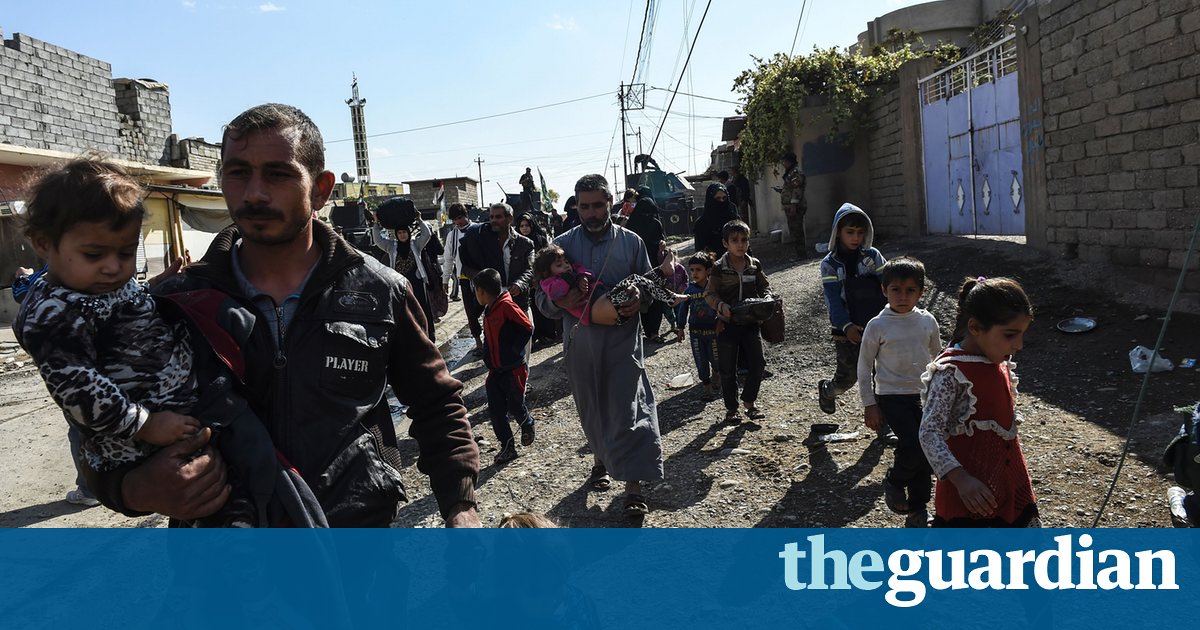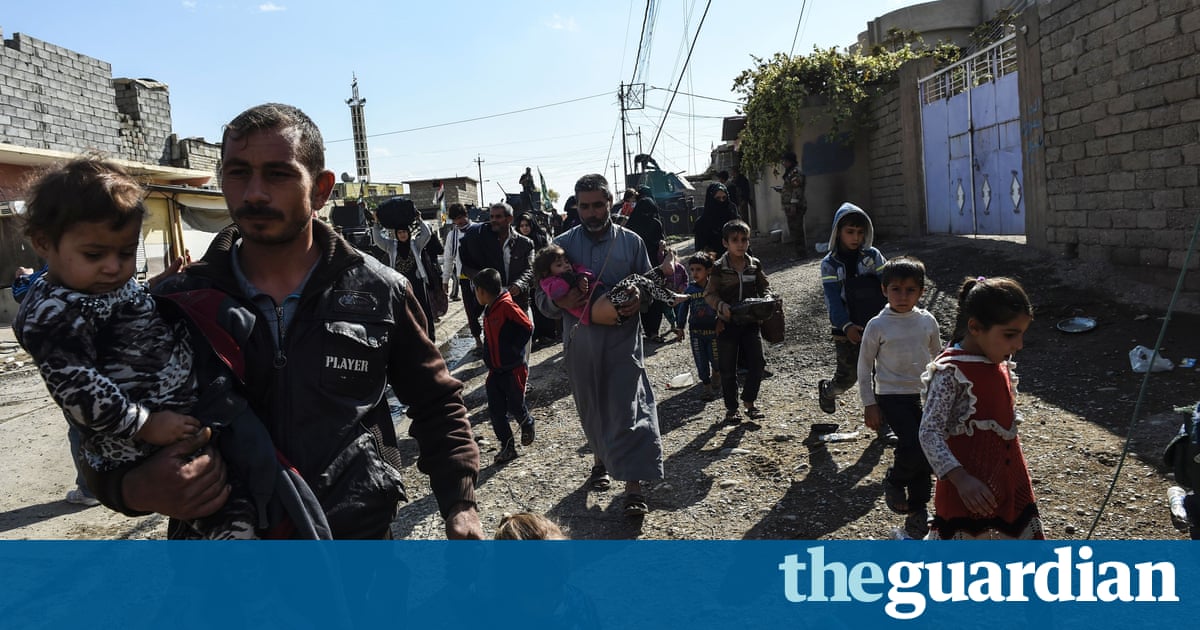Mosul civilians flee heavy fighting and Isis: ‘They killed people in front of me’

Hundreds of exhausted and hungry families who have lived under Isiss rule seek safety as Iraq government troops enter in attempt to reclaim the city

Hundreds of families have fled through heavy fighting in eastern Mosul to seek safety in nearby towns as the battle to recapture the last major city in Iraq held by Islamic State enters a new phase.
Government troops entered the outskirts of the city this week for the first time since it was captured by Isis in 2014, in the first step of what is expected to be in a fierce and prolonged urban battle.
For the past two days, civilians have streamed eastwards, some carrying white flags and flashing victory signs at the government troops and tanks heading towards the city.
On Wednesday afternoon, exhausted and hungry families trudged along the road from Mosul, some carrying toddlers and pushing elderly relatives in wheelchairs. Most of the women covered their faces with niqabs; some of the men still wore the short trousers and long beards demanded by the Isis occupiers.
Ahmad, 56, was walking with his children in the direction of Kurdistan. Everyone is fleeing we were told to leave our houses because of the bombing. There was constant bombardment, he told the Guardian.
Ahmad had managed to send some of his family to safety in Kurdistan when Isis launched its lightning attack on Mosul in the summer of 2014, but he himself had been trapped in the city first by the fighting, and then because Isis confiscated his ID cards, making it impossible for him to cross their checkpoints.
I was stuck under their rule, he said. Daesh was oppressive they killed people in front of my very eyes.
On the outskirts of the eastern neighbourhood of Gogjali, Lieutenant Muntazar from the government counter-terrorism force stood, beneath an overpass, watching as columns of government trucks and tanks headed towards Mosul. The bridge was still wreathed in smoke from the piles of tyres set alight by Isis fighters to cover their retreat.
A dozen burnt-out cars littered the side of the road either Isis suicide cars used in counter-attacks to slow down the government advance, or the remains of government airstrikes.
We have cleaned Gogjali, but we havent killed many Daesh, because most of them fled towards Syria, said Lt Muntazar, using the Arabic name for Isis.
As he spoke, his words were punctuated by the crash of intermittent artillery fire in the direction of the city. We will be in centre of Mosul in days, he said.
Meanwhile, the column of refugees headed west. According to the International Organisation for Migration, about 21,000 people have been displaced since the start of the campaign not counting thousands of villagers captured by retreating jihadists for use as human shields.
Graffiti daubed on doors and walls gave a chilling reminder of the sectarian terror enforced by Isis: some were marked: Sunni property forbidden to enter, on the orders of the Islamic State.
Others were marked with the word rafidah or rejectors a derogatory term for Shia muslims. Many Shia homes and businesses were confiscated by Isis and handed to their supporters, and most of the citys Shia population were killed or fled.
But concern has also been growing over the fate of civilians trapped in the fighting.
Nazir, 30, said he had seen many local people killed in the crossfire. The bombardment has been very heavy. I saw four of my neighbours children die when a mortar hit them I saw their bodies with my own eyes. I dont know if the mortar was fired by the army or Daesh.
Ghanem, 21, from the Sama neighbourhood, was walking hand in hand with his younger sister and brother. Until Isis came, Ghanem had been a student, but the Islamists banned him from studying, he said. We fled because of the fighting but we dont know where we are going.
Asked what life was like under Daesh, Ghanem responded: Very difficult.
Another young man nearby raised his voice and said in English: Black.
Nearby, a bearded old man pleaded with an Iraqi colonel: Please find a place like a mosque for us to stay in for tonight we have many children and it is cold. We have not eaten breakfast and lunch. When the soldiers forced us to leave our houses in Gogjali, they told us there would be food and a camp we can go to.
One man was travelling against the flow: Abas Hamed, 44, had already taken his 16-year-old son to a nearby village for treatment after he was hit by a stray bullet. Now he was returning to Gogjali for the rest of his family.
My son was wounded by a bullet in our kitchen I dont know whether it was the army or Daesh that wounded him, he said.
Whoever had fired the shot, he was glad that Isis had been driven from the town, he said. Our life under Daesh rule was not good. I know of two people that were killed by Daesh after being accused of being peshmerga, he said.
Now that Isis had gone, all Abas had to do was find some way for his family of eight to survive. He had 35,000 dinars about $30 and no idea where he could take his family to safety. Life is difficult, he said.
Read more: https://www.theguardian.com/world/2016/nov/02/mosul-iraq-civilians-flee-isis